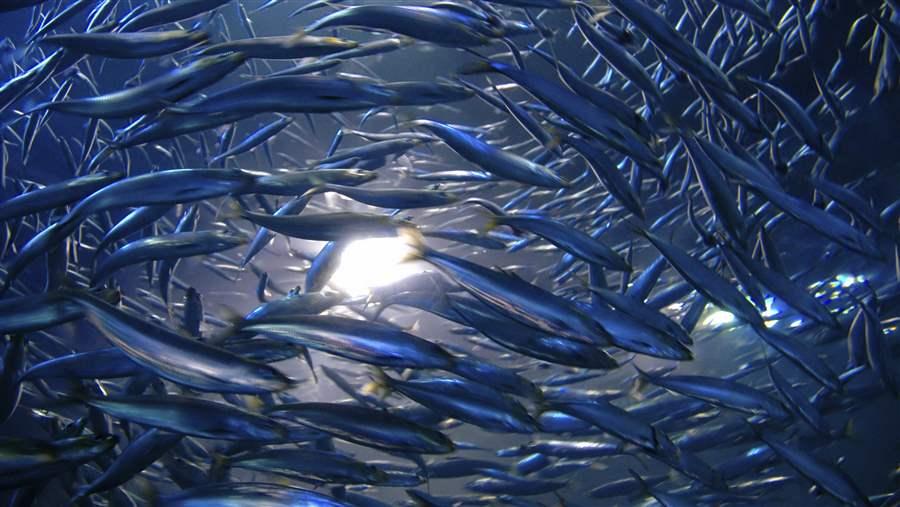New Study Confirms Use of Species-Specific Data to Manage Forage Fish

Forage fish, or small schooling fish such as anchovies and sardines, play a critical role in the marine food web as prey for larger fish, seabirds, and marine mammals. The Task Force developed recommendations that fisheries managers can use to improve the sustainability of these fisheries based on what is known about the ecosystem.
© iStockphoto
A new paper published in the journal Fisheries Research reflects a key recommendation from the Lenfest Forage Fish Task Force report, “Little Fish, Big Impact: Managing a Crucial Link in Ocean Food Webs.” Specifically, both studies recommend that models tailored for individual species and ecosystems should be applied to guide fisheries management.
However, it is important to recognize that the findings of the forage fish task force, released in 2012, were drawn from several approaches: a review of existing theory and practice, nine case studies from around the world, workshops, site visits and two food web modeling analyses. Three external scientists peer-reviewed the results, which have since appeared in the peer-reviewed literature. The bottom line, then and now, is that the abundance of forage fish species can impact predators, and therefore precaution should be taken in managing forage fish.
The Lenfest Ocean Program launched the Forage Fish Task Force in 2008 with the goal of providing practical, science-based advice for the management of forage fish because of their crucial role in marine ecosystems. The effort was a collaboration among 13 pre-eminent marine and fisheries scientists from around the world. The task force recommended that precautionary management measures for forage fish should be put in place when detailed, system-specific information is not available – which was the case for most marine ecosystems at that time. The recommendations were further tailored so that they become less precautionary when a moderate amount of information is available about the specific ecosystem.
A new paper in Fisheries Research, “When Does Fishing Forage Species Affect Their Predators?” by lead author Dr. Ray Hilborn, Professor, School of Aquatic and Fishery Sciences at the University of Washington, raises important areas to explore further, such as the relationship of the size of current forage populations to future population size (the stock-recruit relationship) but diverges from the task force on the importance of the impact of fishing for forage fish on their predators.
Forage fish, such as sardines, menhaden and anchovies, play a critical role in the ecosystem for predators, such as commercially valuable fish, seabirds and marine mammals. In an effort to provide species specific information about forage fish, the Lenfest Ocean Program has supported six additional projects to further understand specific forage species’ role in their ecosystems:
- Accounting for Predators in the Peruvian Anchovy Fishery: Patricia Majluf, Universidad Peruana Cayetano Heredia - http://www.lenfestocean.org/en/research-projects/accounting-for-predators-in-the-peruvian-anchovy-fishery
- Developing Ecosystem Based Reference Points for Atlantic Menhaden: Tom Miller, Chesapeake Biological Laboratory - http://www.lenfestocean.org/en/research-projects/developing-ecosystem-based-reference-points-for-atlantic-menhaden
- Developing an Empirical Dynamic Framework for Gulf Menhaden: George Sugihara, University of California, San Diego - http://www.lenfestocean.org/en/research-projects/developing-and-empirical-dynamic-framework-for-gulf-menhaden
- Developing Ecosystem Based Management Metrics for Forage Fish using Jellyfish: Monty Graham, University of Southern Mississippi - http://www.lenfestocean.org/en/research-projects/developing-ecosystem-based-management-metrics-for-forage-fish-using-jellyfish
- Evaluating the Historic Role of Forage Fish in Lost Fisheries Production: Adrian Jordaan, University of Massachusetts Amherst - http://www.lenfestocean.org/en/research-projects/evaluation-the-historic-role-of-forage-fish-in-lost-fisheries-production
- Deep Sea Forage Species and Commercial Linkages in the North Atlantic: Gareth Lawson, Woods Hole Oceanographic Institution - http://www.lenfestocean.org/en/research-projects/deep-sea-forage-species-and-commercial-linkages-in-the-north-atlantic
It has been almost a decade since the Lenfest Forage Fish Task Force convened. Since then, forage fish have become part of the fisheries management conversation, not only in single species context, but as broader context for ecosystem-based fisheries management. The Program expected and encourages further research on the species in the middle of the food chain to help inform policy-makers about the breadth of implications of their decisions.
